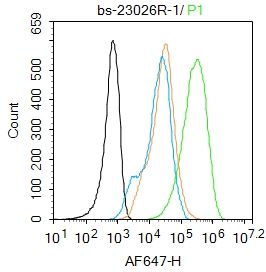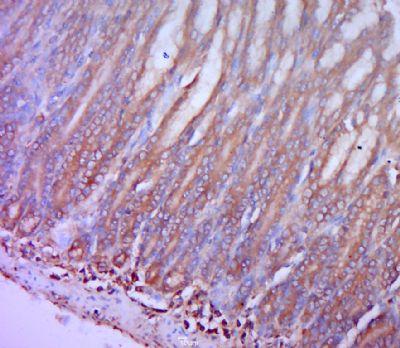CCR-2 Polyclonal Antibody
Purified Rabbit Polyclonal Antibody (Pab)
- 产品详情
- 实验流程
Application
| IHC-P, IHC-F, ICC, E |
|---|---|
| Primary Accession | P51683 |
| Reactivity | Rat |
| Host | Rabbit |
| Clonality | Polyclonal |
| Calculated MW | 42783 Da |
| Physical State | Liquid |
| Immunogen | KLH conjugated synthetic peptide derived from mouse CCR-2 |
| Epitope Specificity | 301-373/373 |
| Isotype | IgG |
| Purity | affinity purified by Protein A |
| Buffer | 0.01M TBS (pH7.4) with 1% BSA, 0.02% Proclin300 and 50% Glycerol. |
| SUBCELLULAR LOCATION | Cell membrane; Multi-pass membrane protein. |
| SIMILARITY | Belongs to the G-protein coupled receptor 1 family. |
| SUBUNIT | Binds to HIV-1 Tat. Interacts with ARRB1. |
| Post-translational modifications | N-glycosylated. |
| Important Note | This product as supplied is intended for research use only, not for use in human, therapeutic or diagnostic applications. |
| Background Descriptions | This gene encodes two isoforms of a receptor for monocyte chemoattractant protein-1, a chemokine which specifically mediates monocyte chemotaxis. Monocyte chemoattractant protein-1 is involved in monocyte infiltration in inflammatory diseases such as rheumatoid arthritis as well as in the inflammatory response against tumors. The receptors encoded by this gene mediate agonist-dependent calcium mobilization and inhibition of adenylyl cyclase. This gene is located in the chemokine receptor gene cluster region. Two alternatively spliced transcript variants are expressed by the gene. [provided by RefSeq, Mar 2009]. |
| Gene ID | 12772 |
|---|---|
| Other Names | C-C chemokine receptor type 2, C-C CKR-2, CC-CKR-2, CCR-2, CCR2, JE/FIC receptor, MCP-1 receptor, CD192, Ccr2, Cmkbr2 |
| Target/Specificity | Detected in monocyte/macrophage cell lines, but not in nonhematopoietic cell lines. |
| Dilution | IHC-P=1:100-500,IHC-F=1:100-500,ICC=1:100-500,Flow-Cyt=1ug/Test,ELISA=1:5000-10000 |
| Format | 0.01M TBS(pH7.4) with 1% BSA, 0.09% (W/V) sodium azide and 50% Glyce |
| Storage | Store at -20 °C for one year. Avoid repeated freeze/thaw cycles. When reconstituted in sterile pH 7.4 0.01M PBS or diluent of antibody the antibody is stable for at least two weeks at 2-4 °C. |
| Name | Ccr2 |
|---|---|
| Synonyms | Cmkbr2 |
| Function | Key functional receptor for CCL2 but can also bind CCL7 and CCL12 chemokines (PubMed:8631787, PubMed:8662823, PubMed:8996246). Its binding with CCL2 on monocytes and macrophages mediates chemotaxis and migration induction through the activation of the PI3K cascade, the small G protein Rac and lamellipodium protrusion (By similarity). Also acts as a receptor for the beta-defensin DEFB106A/DEFB106B (By similarity). Regulates the expression of T-cell inflammatory cytokines and T-cell differentiation, promoting the differentiation of T-cells into T-helper 17 cells (Th17) during inflammation (PubMed:28507030). Facilitates the export of mature thymocytes by enhancing directional movement of thymocytes to sphingosine-1-phosphate stimulation and up- regulation of S1P1R expression; signals through the JAK-STAT pathway to regulate FOXO1 activity leading to an increased expression of S1P1R (PubMed:29930553). Plays an important role in mediating peripheral nerve injury-induced neuropathic pain (PubMed:29993042). Increases NMDA-mediated synaptic transmission in both dopamine D1 and D2 receptor-containing neurons, which may be caused by MAPK/ERK-dependent phosphorylation of GRIN2B/NMDAR2B (PubMed:29993042). Mediates the recruitment of macrophages and monocytes to the injury site following brain injury (PubMed:24806994, PubMed:29632244). |
| Cellular Location | Cell membrane; Multi-pass membrane protein. Note=The chemoattractant receptors are reportedly distributed throughout the cell surface; after stimulation with a ligand, such as CCL2, they are rapidly recruited into microdomain clusters at the cell membrane {ECO:0000250|UniProtKB:P41597} |
| Tissue Location | Epressed in mature thymocytes (PubMed:29930553). Detected in monocyte/macrophage cell lines, but not in nonhematopoietic cell lines (PubMed:8631787). |
Research Areas
For Research Use Only. Not For Use In Diagnostic Procedures.
Application Protocols
Provided below are standard protocols that you may find useful for product applications.
终于等到您。ABCEPTA(百远生物)抗体产品。
点击下方“我要评价 ”按钮提交您的反馈信息,您的反馈和评价是我们最宝贵的财富之一,
我们将在1-3个工作日内处理您的反馈信息。
如有疑问,联系:0512-88856768 tech-china@abcepta.com.























 癌症的基本特征包括细胞增殖、血管生成、迁移、凋亡逃避机制和细胞永生等。找到癌症发生过程中这些通路的关键标记物和对应的抗体用于检测至关重要。
癌症的基本特征包括细胞增殖、血管生成、迁移、凋亡逃避机制和细胞永生等。找到癌症发生过程中这些通路的关键标记物和对应的抗体用于检测至关重要。 为您推荐一个泛素化位点预测神器——泛素化分析工具,可以为您的蛋白的泛素化位点作出预测和评分。
为您推荐一个泛素化位点预测神器——泛素化分析工具,可以为您的蛋白的泛素化位点作出预测和评分。 细胞自噬受体图形绘图工具为你的蛋白的细胞受体结合位点作出预测和评分,识别结合到自噬通路中的蛋白是非常重要的,便于让我们理解自噬在正常生理、病理过程中的作用,如发育、细胞分化、神经退化性疾病、压力条件下、感染和癌症。
细胞自噬受体图形绘图工具为你的蛋白的细胞受体结合位点作出预测和评分,识别结合到自噬通路中的蛋白是非常重要的,便于让我们理解自噬在正常生理、病理过程中的作用,如发育、细胞分化、神经退化性疾病、压力条件下、感染和癌症。







